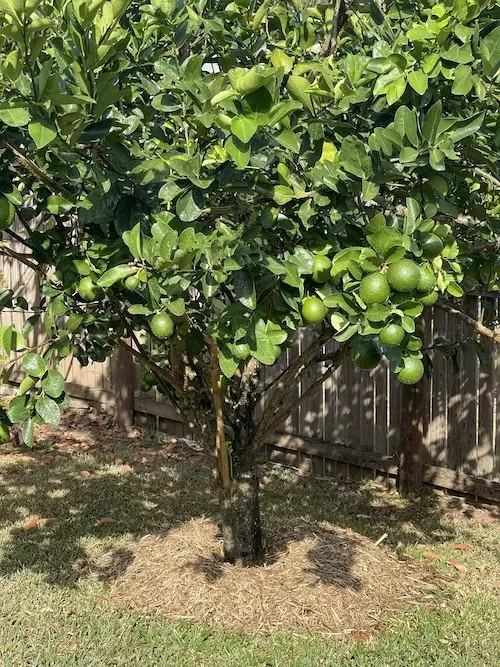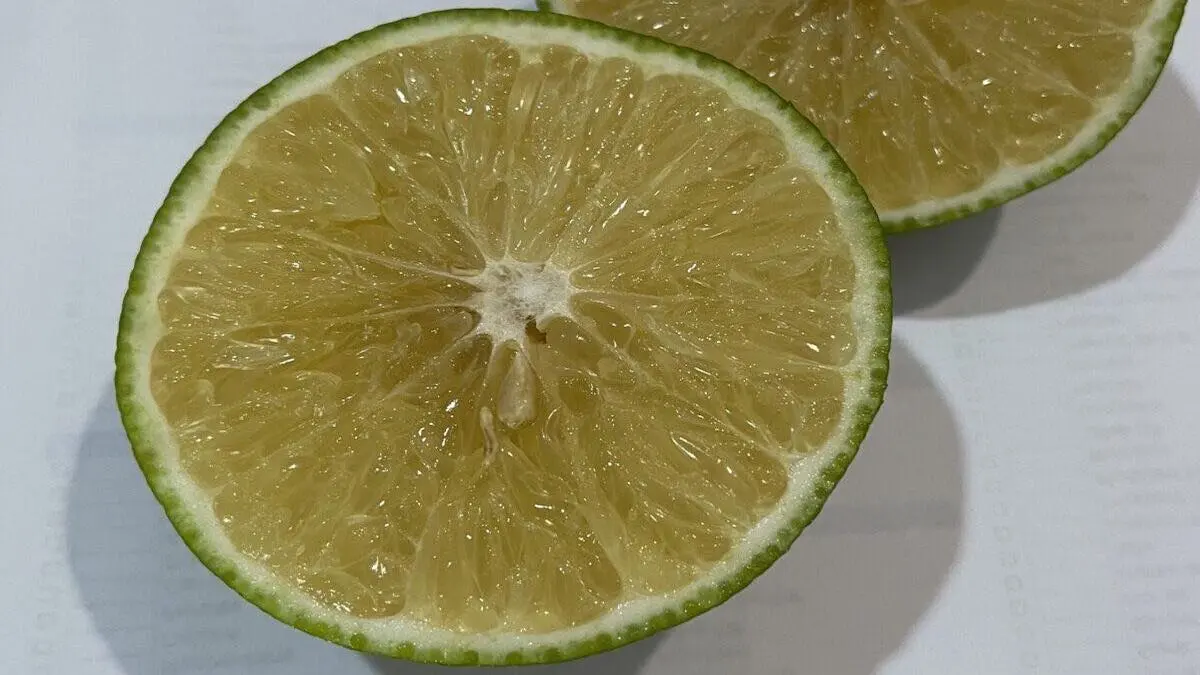Table of contents
Lemonade Tree
Lemonade tree care will see your tree produce a tasty citrus fruit that is a hybrid between a mandarin, an orange and a lemon. Proper care ensures a continuing crop of this unique citrus fruit.
The origins of the lemonade fruit tree are obscure. However it is now grafted onto compatible rootstock to produces a lemon like fruit that are edible and taste like lemonade. Consequently, these fruit trees are now widely grown in Australia and New Zealand.
Lemonade Tree Varieties
Lemonade trees are hybrids often described as sweet lemons. Common varieties include:
- Lemonade Tree (Citrus limon x reticulata): Known for its mild, sweet-tasting fruit, suitable for eating fresh or juicing.
- Improved Lemonade Tree: A grafted variety offering higher yield and disease resistance.
- Dwarf Lemonade Tree: Perfect for small gardens or pots, producing the same sweet fruit in a compact form.,

Lemonade Rootstock
Lemonade trees are overwhelmingly grown by grafting.
Grafted on citrange rootstock which performs well in clay loams and shows tolerance for nematodes. Fruit size and quality from trees on this stock is very good.
You can grow lemonade fruit trees from seed. However, it will be slow to get going and take longer to fruit than a grafted tree.
Time needed: 4 minutes
How to grow lemonade tree from cuttings.
- Select cutting:
Make sure the cutting is at least 20cm (8in) long and has 4 nodes (nodes are the knobby areas on the stem from where the leaves grow).
- Apply hormone:
Put the end of the cutting into rooting hormone mixed with water.
- Pot:
Push a small hole in your potting mix. Then put the cutting in the hole and firm up the soil so it can stand on its own. Make sure the soil is damp to the touch, but not water-logged.
- Transplant:
When your seedling fills the pot, transplant it into your growing spot in your tropical garden.
Lemonade Tree Care
Lemonade trees will grow in most soil types, regardless of the ph. However, they should be planted in a well draining location. While they thrive in the tropics they can also grow in other areas.
This tree thrives in full sunlight and also enjoys high humidity. It is a fine candidate for tropical gardening.
Fertilising
Good care includes feeding your tree. You should fertilise your tree with a slow-release citrus fertiliser. During the growing season, regular applications of a liquid fertiliser can also increase a trees growth and productivity.
Make sure you water your tree well before and after you apply the fertiliser. Otherwise you may burn the plant.
Watering
Mulching is recommended. You should keep the ground at the base of the tree moist, but not wet or soggy.
Water trees regularly throughout the dry season. However, during the tropical ‘wet’ they will be fine without any additional water.
Pruning
Prune to remove dead, damaged or diseased branches. Also prune live branches to ensure fruit will not be too low or even touching the ground (this allows you to mow and weed around the base of your tree). In addition, water shoots and other live branches can be pruned according to your judgement to maintain shape and manageability.
Lemonade Tree Height
This tree will grow between 2.5 metres and 3 metres in height.
Dwarf Lemonade Tree
Dwarf lemonade trees are sold in many plant nurseries these days. They reduce the need for pruning and are suitable in residential areas. Caring for this tree is the same as we have outlined above.
Dwarf Lemonade Tree Care
You can grow your dwarf lemonade tree in a pot. Make sure you select a pot at least 500mm wide. Then position the pot in full sun and do not forget to water it. In the dry season you may need to water your tree deeply 2 or 3 times a week.

How often do you water lemon trees in pots?
Caring for your tree in a pot is pretty much the same as caring for one in the ground. The big difference is your pot will drain faster than the ground does. Therefore you do need to keep the water up to it, so the tree does not get too thirsty.
Lemonade Tree Care Indoors?
Caring for a lemonade tree indoors requires attention to sunlight, soil, and water:
- Light: Place the tree near a sunny window that receives at least 6-8 hours of light daily, or use a grow light.
- Soil: Use well-draining, slightly acidic potting soil.
- Watering: Keep the soil consistently moist but not waterlogged. Allow the top inch of soil to dry between waterings.
- Container: Choose a pot with good drainage holes.
- Feeding: Fertilize monthly with a citrus-specific fertilizer.
- Pruning: Trim for shape and airflow.
These steps help maintain a healthy indoor lemonade tree!
Lemon Trees Problems
Root rot can be a problem with lemonade trees. So while mulching is recommended, you should pull back the mulch a few centimetres from the base of the tree.
Pests of lemonade trees include mealybug, aphids and fruit fly. However, regular application of ‘white oil’ can help address these pests. White oil is an effective organic pesticide that you can make at home.
Lemonade Fruit
The fruit looks like a lemon however it is sweeter, less acidic and can be eaten like a mandarin or orange.
Eating The Fruit
The best part of good lemonade tree care is enjoying the fruit. We believe lemonades are best eaten raw. However, there are many uses for the lemonade fruit. You can add it to your favourite cocktails, or to tonic or soda water for a sweeter twist than a traditional lime or lemon.
Health Benefits
Lemonades are low in sodium and devoid of fat and cholesterol. In addition, they offer a number of other health benefits.
Weight Loss
Lemonades are low in calories yet high in fibre. So this makes them an excellent addition to a weight loss diet. Indeed, adding lemonade to your diet is a useful way to curb cravings and boost weight loss.
Fibre
The high fibre and water content in lemonades also makes them filling and good for digestion. Consequently, they can also help with constipation.
Immune System
In addition the fruit is very high in vitamin C which boosts the immune system.
Antioxidants
The lemonade juice is full of vitamins and antioxidants.
Lemonade Tree Bunnings
Bunnings often sell lemonade trees, including the dwarf lemonade tree. These trees are fine, but also consider visiting a local plant nursery. You will be surprised with what they have to offer.
Other Tropical Fruits
- Australian Finger Lime
- Black Sapote
- Blood Orange
- Custard Apple
- Dragon Fruit
- Grumichama Tree
- Guava Tree
- Lemonade Tree Care
- Mamey Sapote
- Meyer Lemon
- Natal Plum
- Passion Fruit
- Paw paw
- Jaboticaba
- Kumquat
- Mulberries
- Rambutan
- Star Apple
- Grow Watermelon

